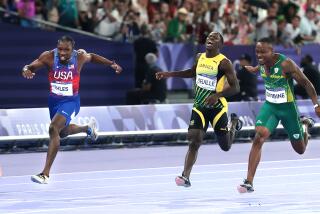Oh, What a Relief 10,000-Meter Finish Is : Track and field: Haile Gebrselassie of Ethiopia dodges Kenyans to win second title in a row at World Championships.
- Share via
GOTEBORG, Sweden — He did not have to dodge a punch or a shoe thrown in his direction, so Ethiopia’s Haile Gebrselassie no doubt considered the successful defense of his 10,000-meter title Tuesday in track and field’s World Championships routine. Considering that the sun has turned soft, signaling a coming change of seasons as the temperature even at mid-day seldom climbs out of the 70s, it is possible that he did not even break a sweat.
He won in 27 minutes 12.95 seconds, the eighth-fastest time ever and the fastest in a major championship, and probably could not have afforded to tarry on the Ullevi Stadium track much longer as the next four finishers ran personal records. That includes the 1992 Olympic champion, Morocco’s Khalid Shah, second in 27:14.53, and the world cross-country champion, Kenya’s Paul Tergat, third in 27:14.70.
Yet Gebrselassie, 22, appeared in control from the ninth of the 25 laps, after quick-starting but perhaps not-so-quick-thinking American Todd Williams relinquished the lead, and did not have to exert himself until the final 190 meters, when he spurted out of a pack of five contenders and easily beat them to the finish line. He ran his last 200 meters in 25.3 seconds.
It was hardly a novel strategy. He followed the same plan to pass defending champion Moses Tanui of Kenya in the stretch during the World Championships two years ago at Stuttgart, Germany.
The difference was that unlike the vanquished in this race, Tanui considered himself at a huge disadvantage, having lost one of his shoes on the next-to-last lap after Gebrselassie clipped his heel. When that race ended, Tanui retrieved the shoe and threw it at Gebrselassie, then attempted to engage him in a fight during a news conference.
Gebrselassie wanted no part of that after having been on the receiving end of Kenyan Josephat Machuka’s sucker punch the year before when the Ethiopian crossed the finish line first in the World Junior Championships at Seoul, South Korea.
“The Kenyans are very nice before and after the race,” Gebrselassie said Tuesday, accepting the incidents as part of a distance runner’s life. “During the race, everybody fights with everybody.”
Still, he was wary that the three Kenyans in the final, including Machuka, might implement a strategy devised to hinder Gebrselassie even if it came at the expense of one or more of them.
If they had such an idea, it never materialized. Perhaps that was because Tergat and Machuka are inexperienced track runners, or perhaps it was because there are so many young Kenyan runners attempting to establish themselves at the world level that it is every man for himself.
“I thought maybe they would make a tactical run,” Gebrselassie said of the Kenyans, who, besides Tergat’s bronze medal, had to settle for Machuka’s fifth place and Joseph Kimani’s sixth. “I didn’t see it.”
Much of what track and field observers expected to see did not occur during the first four days of competition.
A couple of favorites, France’s Marie-Jose Perec in the 400 meters and Belarus’ Natalia Shikolenko in the javelin throw, won Tuesday. Perec easily held off second-place Pauline Davis of the Bahamas and third-place Jearl Miles of the United States, the defending champion.
The meet’s largest crowd, 44,102, was attracted primarily to the men’s high jump because of the presence of one of Sweden’s favorite sons, Patrik Sjoberg. On the close miss that eliminated him from the competition, dropping him into sixth place, all the spectators seemed to gasp at once.
They were startled again when the overwhelming favorite, Cuba’s Javier Sotomayor, joined Jackie Joyner-Kersee, Heike Drechsler and Linford Christie in the category of major disappointments as history’s first 8-foot high jumper finished second to Troy Kemp of the Bahamas. Who will be next to fall? Michael Johnson in today’s 400 final? Sergei Bubka in the pole vault Friday?
“A lot of the favorites are older now,” said Dan O’Brien, who managed to avoid the upset epidemic Monday in the decathlon. “They’re feeling it.”
But, except for U.S. male 100-meter sprinters, the most collectively heartbroken competitors here may be the Kenyan runners. As poor as their performances were in the 10,000, they at least had three finalists. They had none in Tuesday’s 800-meter final.
Or they had none who would claim he is Kenyan.
The champion in 1:45.08 was Wilson Kipketer, who moved from Kenya to Copenhagen five years ago to study as an electrical engineer and train--and, for the first time, competed here for Denmark.
“This is something new for me, something new for Denmark,” said Kipketer, 24, the first Dane to win a track and field gold medal in a major championship. “I have a new life in a new country.”
The Danish government is not convinced. Because he has not lived in Denmark for seven years, he will not receive citizenship in time to compete for the country in the 1996 Olympics unless he is awarded a rare, special exemption. He cannot expect assistance from Kenyan track and field officials, who are bitter about his defection.
His competitors do not know what to make of him, except that he is not Danish.
“He looks like a Kenyan to me,” said Norway’s Vebjorn Rodal, who finished third Tuesday. To escape Norwegian ice and cold in the winters during his formative years, Rodal trained inside a tunnel dug into a mountain to house an electrical power plant. Much like Kipketer, no doubt.
More to Read
Go beyond the scoreboard
Get the latest on L.A.'s teams in the daily Sports Report newsletter.
You may occasionally receive promotional content from the Los Angeles Times.






